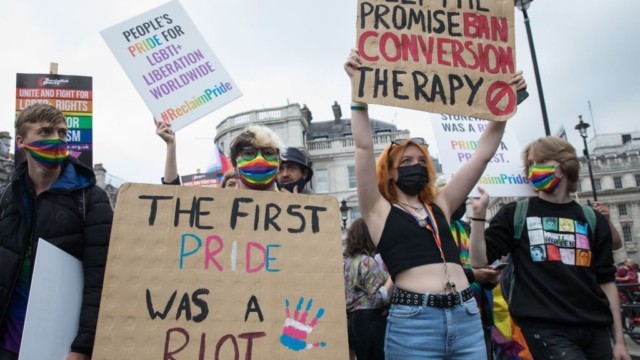By Tony O’Reilly-
The UK has cancelled its first-ever international LGBT+ conference after a boycott by more than 100 organizations.
Organisations including Stonewall withdrew their support for the Safe To Be Me event due to take place in London this June, following the decision to exclude transgender people from the ban.
However, The event will not go ahead after LGBT+ charities and other groups pulled out over the government’s stance on conversion therapy.
Conversation therapy is the pseudoscientific practice of attempting to change an individual’s sexual orientation from homosexual or bisexual to heterosexual or their gender identity from transgender to cisgender.
Therapy aimed at transgender people was excluded from a ban outlined last week.
Reacting to the event’s cancellation, Conservative MP Dehenna Davison tweeted: “We had such a huge opportunity to prove the UK (and the Conservative Party) is a defender of freedom.
“As a Conservative member of the LGBT+ community, it is so wrong it has come to this.”
For Labour, shadow attorney general Emily Thornberry said the cancellation of the conference was a “sickening waste”.
“For three years, I urged the Government to use the opportunity they had as co-chair of the (intergovernmental) Equal Rights Coalition to take a global lead on LGBTQ+ issues,” she posted on Twitter.
A number of LGBT+ organizations and charities had signed an open letter written by campaign group Stonewall which said they would not lend their support for the event unless Boris Johnson included transgender people in the ban.
Earlier on Tuesday the government’s first LGBT+ business champion resigned over the exclusion of transgender people from any conversion therapy ban that would instead only apply to sexual orientation.
The unpaid role was created especially in the lead-up to the conference, and was expected to last at least 18 months.
In a letter to the prime minister, Iain Anderson said he had “no choice” but to quit and did so with a “heavy heart”. “This is a sad day but one where we must begin to change the narrative and look to build a country where every person can feel safe and live a life with dignity and respect.”
At the conference, Mr Anderson would have been expected to showcase what UK businesses have done in reducing workplace discrimination and promoting quality for LGBT people.
He wrote: “Trust and belief in the government’s overall commitment to LGBT+ rights has been damaged.
“I believe a comprehensive plan to support LGBT+ people to play their full part in our society is urgently needed.”
In a statement, a government spokesperson thanked him for his contribution and said they were considering the issue of transgender conversion therapy further in what they described as a “legally complex” area.
Conservativ practice of attempting to change an individual’s sexual orientation from homosexual or bisexual to heterosexual or their gender identity from transgender to cisgender
Some groups have expressed concern it could impede those helping people with gender dysphoria by blocking explorative therapies or those that do not automatically affirm someone’s gender identity.
The government had promised to outlaw the practice of conversion therapy for all, but announced last week any ban would only apply to attempts to alter a person’s sexuality, not attempts to try to change people’s gender identity.
A spokesperson said the government would carry out “separate work” on the issue of transgender conversion therapy but it was keen for any legislation not to have “unintended consequences”, adding it was a “legally complex area”.
The U-turn led to more than 100 organizations withdrawing from the Safe To Be Me Conference, which was due to be held in London over three days this summer.
Boris Johnson has previously called the practice of conversion therapy “repulsive and abhorrent” and had promised plans to outlaw it on a number of separate occasions.
A number of gender critical groups had fought for the ban not to include conversion therapy relating to issues of gender identity.
Responding to the legislation on Friday, Nikki da Costa, a former director of legislative affairs at No 10, said elements of the law would have had “profound consequences for children struggling with gender dysphoria”.

